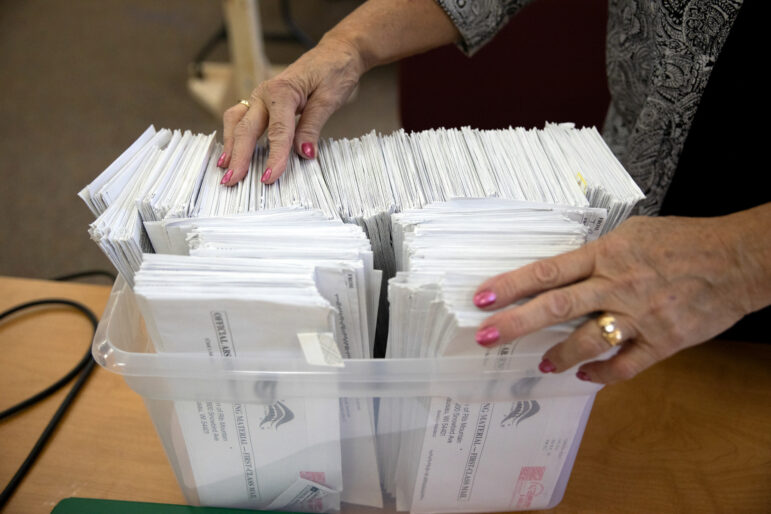Elections Commission Votes to Track Fraudulent Absentee Ballot Requests
Right-wing activists have illegally requested absentee ballots on behalf of other people.
The Wisconsin Elections Commission voted unanimously Wednesday to continue sending verification postcards to voters who request that absentee ballots be sent to addresses different from the one where they’re registered.
The decision, which came just days after the court appearance of a man facing two felony and two misdemeanor charges for allegedly fraudulent requests of the absentee ballots of Wisconsin Assembly Speaker Robin Vos (R-Rochester) and Racine Mayor Cory Mason, is meant to safeguard against people taking advantage of the online absentee ballot request system to illegally request other people’s ballots.
Ahead of the November midterm elections, about 17,000 people have requested ballots be sent to different addresses, commission staff reported.
Prior to taking the vote, Republican commissioner Robert Spindell said he wanted to continue the practice of sending the postcards indefinitely — a step that Democrats flinched at, saying they didn’t think the problem was so widespread as to require a regular use of taxpayer money.
“Frankly, I don’t know why we’re spending staff time and taxpayer dollars on this process,” Democratic commissioner Mark Thomsen said. “You know, it was fraudulent, intentionally fraudulent activity that kicked it off and we wanted to address it. There’s no evidence that that’s ongoing. We haven’t done this. There hasn’t been fraud in the system. So I don’t know why we’re doing this, are we gonna send emails out every day now? This is like overkill and it’s fear mongering and you know, our municipal clerks know how to run elections.”
“I think that it makes sense as a confidence builder,” Republican commission chair Don Millis said. “It’s trying to reassure the public that we’re paying attention.”
Democratic commissioner Ann Jacobs said she would approve the mailing of the postcards ahead of the November election to make sure voters know the issue is being monitored, but that it should be reassessed later and if no voters report problems again, it doesn’t make sense to keep sending them.
“I think it’s worthwhile to do for one more election,” Jacobs said. “But the one thing I did want to emphasize was the line in the staff memo that says no, not one individual contacted staff to record a fraudulent ballot request and I think that the fact that fraudulently requesting an absentee ballot is a felony has deterred people for tens of years from doing exactly what this is designed to prevent. So to a certain extent, I appreciate Commissioner Thomsen’s concern that this is a certain amount of theater, that we’re doing this to make people feel better while knowing that our systems are really in a good place. I also agree that it appears that that theater is necessary. And so I think sending out those postcards is a good idea, certainly for this election. And then if we get the same record, I do think that we can allow it to lapse.”
Also in the meeting, the commission approved the guidelines and timing for how municipal clerks should conduct audits of voting machines following the November election and what to do if the statutorily required audits overlap with a recount.
The commission also voted 5-1, with Spindell casting the only dissenting vote, to approve the drafting of a scope statement in order to begin the process of creating an administrative rule guiding how election observers are supposed to conduct themselves in polling places on election day.
The administrative rulemaking process can take months or even years to work through multiple layers of required approval, and the scope statement can’t include details about what the rule will ultimately do.
Voting rights and guardianship
In a public comment session at the beginning of the meeting, Barbara Beckert, executive director of Disability Rights Wisconsin, spoke about the importance of protecting the voting rights of Wisconsinites under guardianship orders. In recent weeks, Republicans have been agitating to have voters under guardianship orders removed from the state’s voter lists in the name of preventing people who have been declared incompetent, and therefore not legally allowed to vote, from casting a ballot.
“Our comments address the voting rights of people under guardianship because we believe clarification is needed based on a recent hearing and related requests made to the Wisconsin Election Commission,” Beckert said. “Wisconsin has a limited guardianship system. That means the court can decide if the ward may retain some civil rights, including the right to vote.”
She continued: “In Wisconsin, people under guardianship retain the right to vote unless the court expressly removes that right. The details of those individual cases are private and confidential information about the individual’s guardianship case.” They are not posted on public court records, she added.
“However, statutes of Wisconsin protect privacy and that must be maintained,” Beckert said. “Voters found by a court to be incompetent should not be on the active voter rolls. Any proposals to inactivate everyone who has a guardian are contrary to Wisconsin law.”
Disability Rights Wisconsin “has developed new resources regarding voting rights under guardianship and we invite you to take a look at those on our website,” she said. “We welcome the opportunity to work with the Commission and policy makers to increase understanding of voting rights and guardianship.”
Elections commission votes to stay on watch for fraudulent absentee requests was originally published by the Wisconsin Examiner.
If you think stories like this are important, become a member of Urban Milwaukee and help support real, independent journalism. Plus you get some cool added benefits.






















